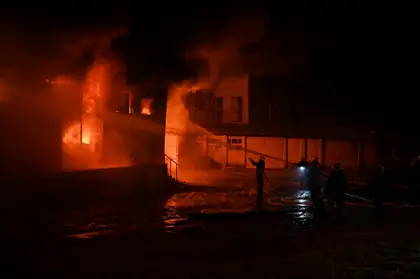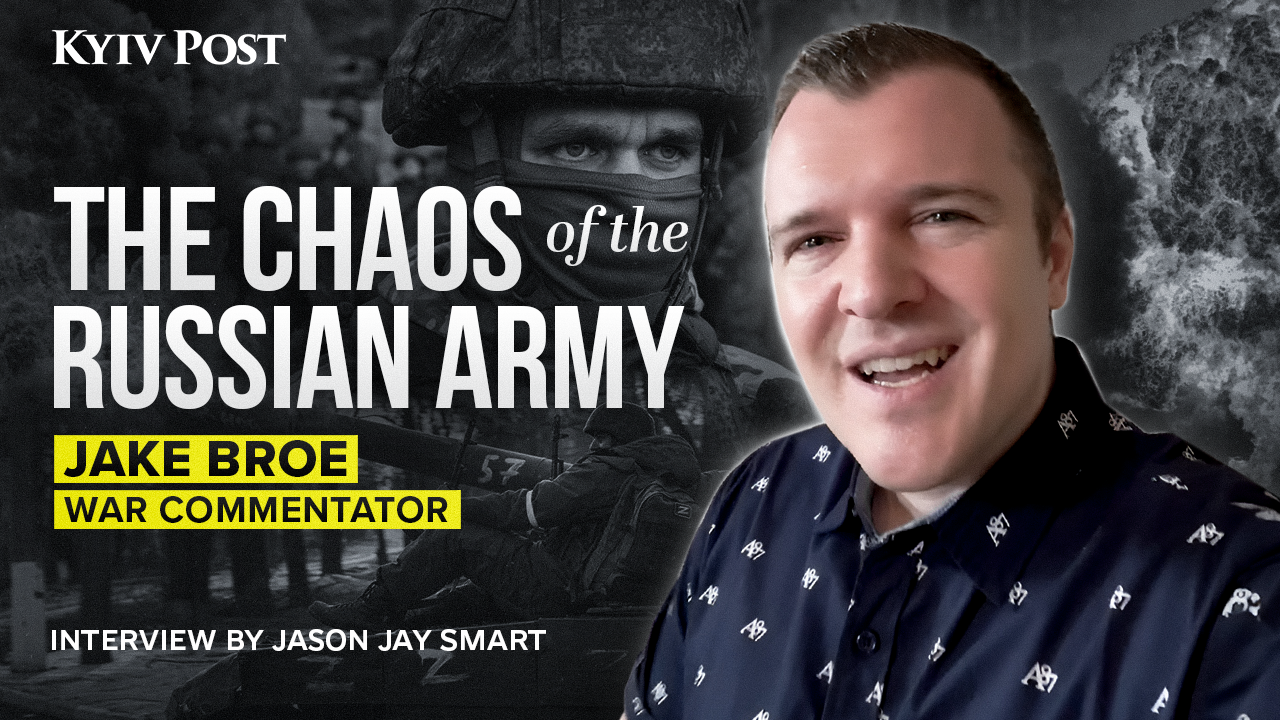Overview:
- Seven killed in Kharkiv fire after nationwide weekend wave of Russian air assaults
- Stoltenberg calls on Alliance to build military-industrial base more quickly
- France cites security reasons for delaying Macron visit to Ukraine
- Moscow’s grip slowly closes in on southern and northern Avdiivka
- ISW says lull in anti-aircraft fire provides Russian pilots a window in the East
- US Senate moves closer to passing aid for Ukraine, Israel and Taiwan
Russian drones kill seven in massive oil depot conflagration in Kharkiv
JOIN US ON TELEGRAM
Follow our coverage of the war on the @Kyivpost_official.
A Russian drone attack on Kharkiv on Saturday started a blaze that killed seven civilians, including three children.
The drones struck an oil depot in Ukraine’s second-largest city, causing an inferno that engulfed about 15 residential homes. Kharkiv region governor Oleh Syniehubov said at least 10 drones were launched at the city, eight of which, he said, were shot down.
The head of the investigative department of the National Police cited a resident as seeing “a true hell: first, the fuel flowed, then everything caught fire,” he wrote on Facebook. He said a family of five, including children aged 7, 4 and nine months were trapped in their home and burned alive.
Two other adult civilians died in the same neighborhood fire.
Following the attack, Ukrainian officials said that defense forces shot down 40 of 45 Iranian-made Shahed drones targeting Ukraine in the early morning hours of Sunday.
NATO chief asks member states to switch to “high-tempo conflict production” in interview
NATO Secretary General Jens Stoltenberg, in an interview with a German daily on Sunday, said that Europe needs to step up its arms production from “slow peacetime to high-tempo arms production” to prevent “potentially decades of confrontation” with Moscow, AFP reported.
The remarks come in the lead-up to a summit of NATO defense ministers in Brussels coinciding with the second anniversary of the Russian invasion of Ukraine.

EXPLAINED: What We Know About Russia’s Oreshnik Missile Fired on Ukraine
Stoltenberg told Welt am Sonntag: “We need to reconstitute and expand our industrial base faster, to increase deliveries to Ukraine and refill our own stocks.”
AFP also reported that the German army’s chief-of-staff, General Carsten Breuer, said the country needs to be “war ready” in five years.
On Friday, US President Joe Biden met with German Chancellor Olaf Scholz and complained that Washington’s inability to agree thus far on additional assistance to Kyiv “is close to criminal neglect,” the former criminal defense lawyer said.
France delays aid announcements in Kyiv out of security concerns
French President Emmanuel Macron delayed a visit to Ukraine initially planned for Feb. 13 and 14, when he was to sign a bilateral security agreement with Ukraine and announce the delivery of a new round of French-made SCALP missiles for Kyiv.
No new date was suggested. State news agency Ukrinform reported that the French visit was postponed for “security reasons.” Ukrinform also said that the simultaneously planned meeting of France-Ukraine Business Council, Medef International, was also put off, noting that “Macron was also supposed to visit Odesa and announce the creation of a €200 million fund ($216 million), paid out as donations for civil projects.”
Operations: Avdiivka
Russian forces continued to make confirmed advances around Avdiivka over the weekend, the Institute for the Study of War (ISW) reported. Gelocated footage shows newly gained positions for Moscow’s troops both in southern Avdiivka and in northern parts of the critically important city still held by Ukraine’s Armed Forces (AFU).
Troops advanced along Chernyshevskoho, Sportyvna, and Soborna streets in southern parts of the city, while an individual Kremlin-affiliated source claimed that forces advanced from the blown-out Tsarska Okhota restaurant area in southeastern environs.
RU POV - Russian soldiers walking calmly in Chernyshevskogo, Sportyvna and Soborna streets
— Franfran2424 (@franfran2424) February 9, 2024
Source: https://t.co/NWYmRX1SC4
Locations - South Avdeevka, Avdeevka direction: 48.117364, 37.765188 - 62s
48.119362, 37.753424 - 185s
Tags: @GeoConfirmed
Images: https://t.co/8GeMiY7zhV pic.twitter.com/SwiB4p3XKy
Russian military bloggers cited by the ISW also claimed that Russian forces advanced in northern Avdiivka along Sapronova and Lesy Ukrainky streets and towards Hrushevskoho Street as well as in northeastern Avdiivka near the quarry, but ISW analysts said they have not observed visual confirmation of these claims.
Meanwhile, fighting was confirmed to have continued northwest of the mission-critical city, near Keramik, Novobakhmutivka, Stepove, and Ocheretyne; near the coke and chemical plant.
Russian aviation takes advantage of rare window in anti-aircraft defense
The ISW went on to say that a perceived shortage in Ukrainian anti-aircraft artillery has allowed Moscow’s fighters and bombers to increase the frequency of their sorties over Avdiivka.
Online sources reported that Russian aviation has intensified its support of offensive operations in eastern Ukraine this year, particularly near Avdiivka, “suggesting that limited Ukrainian air defense missile stocks may be giving Russian aviation more opportunities to attack, ISW analysts wrote.
“Critical Ukrainian shortages of air defense missiles could permit Russian forces to operate aircraft, especially manned aircraft that generally carry heavier payloads, closer to and beyond the current front line in Ukraine at scale… and the intensification of Russian aviation operations at scale would represent a significant threat to Ukraine.”
US Senate clears another hurdle toward Ukrainian aid
The US Senate moved closer to passing a $95 billion package for foreign aid on Sunday, voting in a mostly bipartisan fashion, 67-27, on Sunday to open the doors to a final vote on the measure, soon, to fund Ukraine, Israel and Taiwan.
If it passes the upper house, which all accounts seem to indicate it will, the House of Representatives will still have to vote the measure into law, which includes about $60 billion for Kyiv.
Sunday’s session was an extraordinary request, with leadership asking senators to come to Capitol Hill during the sacred institution, and politically important event, of the American football Super Bowl.
BREAKING: 18 Republicans, along with Democrats, have just propelled the Senate forward in advancing a $95 billion aid package for Israel, Ukraine, and allies, with a 67-27 vote, overcoming a procedural hurdle and inching closer to passage. It’s so important they worked on Super… pic.twitter.com/NdwUK7gDun
— Simon Ateba (@simonateba) February 11, 2024
You can also highlight the text and press Ctrl + Enter









